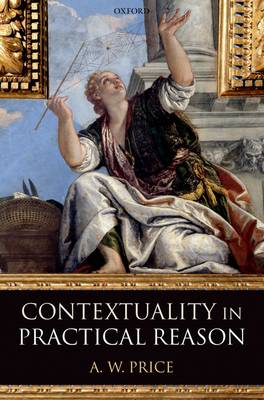
- Afhalen na 1 uur in een winkel met voorraad
- Gratis thuislevering in België vanaf € 30
- Ruim aanbod met 7 miljoen producten
- Afhalen na 1 uur in een winkel met voorraad
- Gratis thuislevering in België vanaf € 30
- Ruim aanbod met 7 miljoen producten
Zoeken
Omschrijving
A. W. Price explores the varying ways in which context is relevant to our reasoning about what to do. He investigates the role of context in our interpretation and assessment of practical inferences (especially from one intention to another), practical judgements (especially involving the term "ought"), inferences from conditional "ought"-judgements, and the ascription to agents of reasons for action. Practical inferences are subject not to a special logic, but to a teleology that they share with action itself. Their inherent purpose is to forward an end of action, and not to be logically valid. Practical judgments are commonly to be understood relatively to an implicit context of goals and circumstances. Apparently conflicting or imprudent "oughts" can show up as true once they are interpreted contextually, with an eye to different ends, and different aspects of a situation. This makes acceptable certain patterns of inference that would otherwise license counter-intuitive conclusions. What reasons for action are ascribable to an agent depends both on the context of action, and on the deliberative context. Facts tell in favor of actions against a background of particular circumstances, and in ways whose relevance to an ascription to an agent of a reason for action depends upon the perspective within which the ascription is made.
Specificaties
Betrokkenen
- Auteur(s):
- Uitgeverij:
Inhoud
- Aantal bladzijden:
- 244
- Taal:
- Engels
Eigenschappen
- Productcode (EAN):
- 9780199534791
- Verschijningsdatum:
- 2/06/2008
- Uitvoering:
- Hardcover
- Formaat:
- Genaaid
- Afmetingen:
- 155 mm x 234 mm
- Gewicht:
- 521 g

Alleen bij Standaard Boekhandel
+ 354 punten op je klantenkaart van Standaard Boekhandel
Beoordelingen
We publiceren alleen reviews die voldoen aan de voorwaarden voor reviews. Bekijk onze voorwaarden voor reviews.











